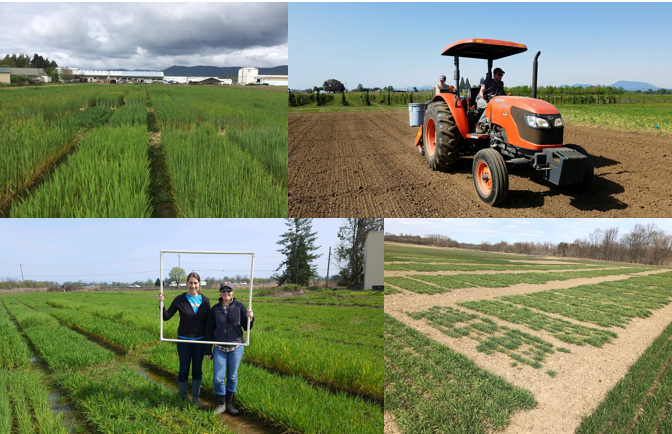Research Updates
August 2022: Naked Barley and Dry Bean Field Day at Oregon State University Lewis Brown Farm
At the end of a long gravel road, past the organic squash and berry plots on the Lewis Brown Horticulture Farm on a hot August afternoon, it was a relief to see a tent in the shade of a hedgerow, with a table of inviting snacks and drinks. Next to it, another table displayed bowls and vials of colorful grains and beans. Before us stretched a field of spring-planted naked (hull-less) barley-- a checkerboard of small plots. Even from a distance, you could see a tremendous diversity of plant heights, growth habits, vigor, disease resistance, and colors: white, black, blue and purple. Welcome to the Naked Barley and Dry Bean Field Day, where a group of researchers, farmers and brewers were ready to learn about research on growing, breeding, and using these nutritious crops.
Spring planted naked barley
Color variations in naked barley seed
Organic Naked Barley
Although barley has been a staple food for millennia, naked barley is less commonly grown and eaten than hulled barley. Comparatively little is known about which naked barley varieties are best for different markets and uses. A team of researchers and food scientists in five states led by Brigid Meints of Oregon State University is trying to change that. Brigid amassed a “diversity panel”, a collection of 384 barley accessions from around the world. Over the past several years, she and her collaborators planted spring and fall trials to learn which varieties have traits that are important for production, such as resistance to diseases like leaf rust, stripe rust, and loose and covered smut, winter hardiness, drought tolerance, and resistance to lodging (falling over). At Oregon State University, she works with food scientists, animal scientists and brewers to identify traits for baking, malting, brewing, and for use as poultry feed, with the goal of breeding new, multi-purpose varieties for organic production.
Brigid Meints with a test plot of 6-row black naked barley crossed with white 2-row covered barley
Since conventional growers use fungicides, many plant breeders have not recently selected barley strains for resistance to fungal seedborne diseases like loose and covered smut; however, disease resistance is important both for organic growers, and for conventional growers who have found that fungicides are becoming less effective. Fungal diseases cause yield losses as well as poor grain and malt quality. To find out which varieties are least susceptible, Brigid and a Master’s student, Cristiana Vallejos, are conducting fungal inoculation studies with spores from covered and loose smut on the barley varieties in the diversity panel. Conducting trials in multiple locations is important because some diseases are more prevalent in some regions than others; for example, fusarium head blight is problematic in the northeast and midwest, but not in Oregon. Since winter temperatures are higher in the Oregon and California trial locations, it will also be useful to know how different varieties performed in colder states like New York and Wisconsin.
Leaf rust (left) and covered smut (right) on naked barley.
Many naked barley varieties have high levels of beta-glucan, which is beneficial for human health—but it can interfere with filtration during malting. In the diversity panel, Brigid and Cristiana have identified varieties with different levels of beta glucan. They are working with a mini malter and a micro malter to test small batches of naked barley using different malting protocols, germinating the barley for different lengths of time, and filtering with and without mash filters, to learn how to get the best results. One problem they encountered is that some naked barley varieties suffer embryo damage during harvesting—which results in poor germination in the malting process, or for use as seed. Cristiana is screening the entire diversity panel to see which varieties are less prone to embryo damage. High beta glucan levels are also undesirable in poultry feed, since they can cause digestive problems in chickens! However, a study conducted as part of this project found that a proportion of up to 50% of naked barley with moderate beta glucan levels can be fed to chickens without negatively impacting health or egg production.
Unlike wheat, there is no uniform classification of different types of naked barley flour in terms of hardness, starch levels and other food quality traits. Jordyn Bunting, a recent Master’s graduate, analyzed naked barley food characteristics. He found that different varieties behave very differently in baking, and identified some traits that could help categorize the food functionality of different varieties. Learn more about his work in a webinar he presented in March, 2022.
Dry Beans
As if 384 barley accessions were not enough to evaluate, Brigid and Cristiana also planted dry beans next to the barley field: no less than 330 small plots of 200 varieties from different seed companies and university breeding programs. They are screening them for performance under organic production, early maturity, disease resistance, and resistance to shattering during harvest, to breed new varieties for organic production. Many, though not all of the beans were susceptible to Bean Common Mosaic Virus (BCMV), and some of the ones that were resistant to BCMV were unfortunately sensitive to a root rot.
Some of the many dry beans planted at the Lewis Brown farm
Jim Myers reported on his work to improve the seed size and color of virus resistant yellow dry beans. Yellow beans (Peruano, Azufrado or Mayo Coba) are popular in Mexico, and he and his colleagues have developed lines with resistance to both Bean Common Mosaic Virus and Beet Curly Top Virus. One of their varieties, ‘Patron’ was already released, but now they are improving the consistency of a more desirable bright yellow color and larger seed size. In 2021, 17 lines were planted and tested for germination, days to 50% flowering, foliage color, days to maturity, and days to harvest. Harvest data included total yield and weight per 100 seeds. The seed was further evaluated for color, uniformity of color, size, uniformity of size, shape and overall appearance using a 1-5 rating scale. Eight lines were selected for further evaluation, and planted in both conventional and organic production in 2022, and final selections will be considered for release.
‘Patron’ yellow dry bean (Phaseolus vulgaris)
Cristiana Vallejos holding a bean with Bean Common Mosaic Virus.
On such a hot summer day, seeing all the diversity in the field and hearing how there is so much more to learn about barley and beans makes one hungry and thirsty! Luckily, Andrew Ross had baked some ‘Purple Valley’ naked barley canestrelli cookies flavored with anise, and ‘Buck’ naked barley Grassmere ginger shortbread, along with some sourdough bialys with caremelized onions. Learn more about the NIFA OREI funded naked barley project (including recipes) at https://eorganic.org/barley .
December 2019
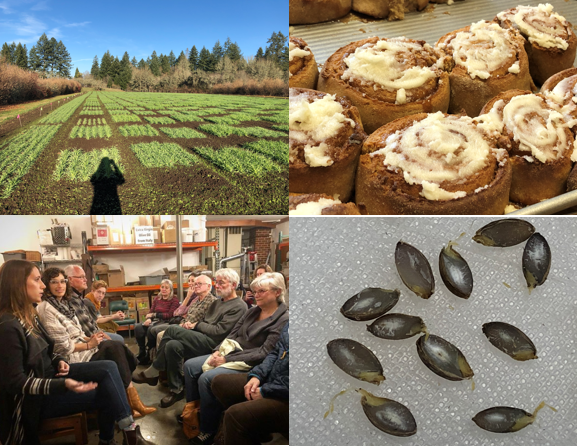
Germplasm:
Regional trials:
- We had a significant amount of covered smut in our SRT this year and will be requesting new seed to ship out in 2020.
- Brigid will be measuring threshability on all samples that I receive from other locations.
Diversity panel:
- Bridgid has been assessing threshability in the Fall Div Panel.
- Brigid will be assessing the diversity panel for covered smut susceptibility in the greenhouse- currently confirming protocols.
Quality testing:
Food testing:
- Jordyn has been testing for food quality on last year’s samples. He has been running beta-glucans, kernel hardness measurements, and RVAs on samples. As soon as we have some complete data sets we will share them.
Malt testing:
- Brigid started tea ball malting the diversity panel to look at tunneling acrospires and hydration indices. She has completed the first 48 samples and got some interesting results
- We will be first CLP malting and then mini-malting the lines that will be going in the OSU Ferm Science brewing trials in the next few months.
- We will be working with Dan Carey at New Glarus to do micro-brews on the same malts in the OSU Ferm Sci study + five F4 selections.
Feed testing:
- The initial broiler trial was completed. Jim Hermes will be doing another trial with longer growing birds.
Outreach/Upcoming:
- We are working to put together an informative barley zine, that will contain basic info and recipes! As soon as this is published we will distribute.
- Lane, Andrew, and Brigid were on a panel about baking with naked barley with Sarah Owens in Portland in November.
- Jordyn and Brigid will be attending the Winter Vegetable Sagra that Lane is organizing to promote barley.
November 2019
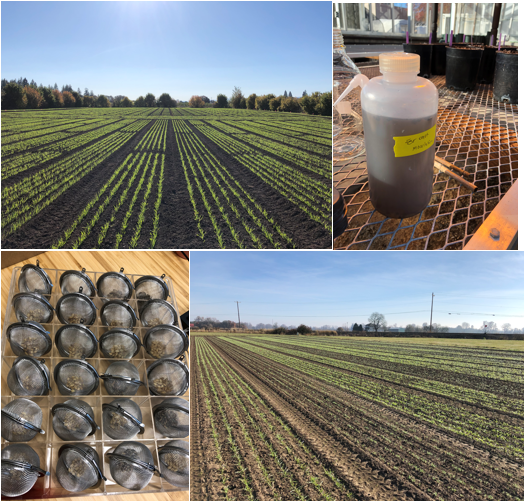
Germplasm:
Regional trials:
- Fall trials are planted and looking great in Corvallis!
- We had a significant amount of covered smut in our SRT this year and will be requesting new seed to ship out in 2020.
Diversity panel:
- The fall diversity panel was planted at OSU and Cornell.
- I have been assessing threshability in the Fall Div Panel.
Quality testing:
Food testing:
- Jordyn has been testing for food quality on last year’s samples. He has been running beta-glucans, kernel hardness measurements, and RVAs on samples. As soon as we have some complete data sets we will share them.
Malt testing:
- Please send seed from the FRT and SRT 2019 harvest to the CCRU when seed is clean. If you have smut balls or ergot in your samples, please remove prior to sending to the CCRU!
- I have started tea ball malting the diversity panel to look at tunneling acrospires and hydration indices.
- We will be first CLP malting and then mini-malting the lines that will be going in the OSU Ferm Science brewing trials in the next few months.
- We will be working with Dan Carey at New Glarus to do micro-brews on the same malts in the OSU Ferm Sci study + five F4 selections.
Feed testing:
- The initial broiler trial was completed. Jim Hermes will be doing another trial with longer growing birds.
Outreach/Upcoming:
- We are working to put together an informative barley zine, that will contain basic info and recipes! As soon as this is published we will distribute to folks.
- Lane, Andrew, and Brigid will be participating in a panel on baking with naked barley with Sarah Owens in Portland later this month.
- Contact Brigid if you would like to present an eOrganic webinar!
October 2019
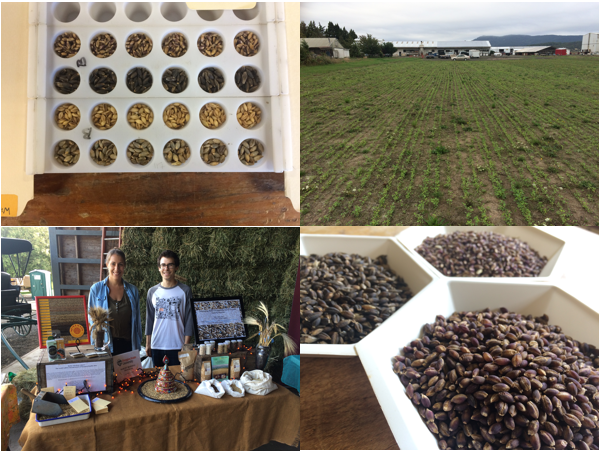
Clockwise from top left: Fall diversity panel prep in Corvallis. Organic alfalfa finally taking off at Hyslop Farm in Corvallis- attempting to establish a healthy rotation for our barley trials. Brigid and Jordyn at the Great Grains event. Excellent threshability on some of the colored lines in the diversity panel.
Germplasm:
- Regional trials:
- Fall regional trial seed was shipped out and may be planted in some states (please update when you get planted!). We’re prepped and ready to go here- likely next week. After emergence, please remember to take an early vigor rating and seedling count!
- We had a significant amount of covered smut in our SRT this year and will be requesting new seed to ship out in 2020.
- Diversity panel:
- Fall diversity panel will be planted at OSU and Cornell. UMN and UW-Madison will be growing 13 lines that survived in Madison last year.
- Brigid has been assessing threshability in the Fall Div Panel.
Quality testing:
- Food testing:
- Jordyn has started testing for food quality on last year’s samples. He has been running beta-glucans, kernel hardness measurements, and RVAs on samples. As soon as we have some complete data sets we will share them.
- Malt testing:
- Please send seed from the FRT and SRT 2019 harvest to the CCRU when seed is clean. If you have smut balls or ergot in your samples, please remove prior to sending to the CCRU!
- Feed testing:
- Layer trial is completed and first publication is in preparation. The broiler trial was started in mid-September.
Outreach/Upcoming:
- Brigid and Lane presented at Camp Camas at Camas Country Mill in Eugene, OR.
- Brigid and Karl attended the Student Organic Seed Symposium in Dodgeville, WI.
- Pat, Brigid, and Jordyn attended Tuality Plains Great Grains event and got to enjoy roasted barley tea, malt, beer, and bread make from naked barley!
- Andrew Ross prepared crackers and dinner rolls from Buck and Streaker that were featured at the annual OSU Harvest dinner.
- Organic producer survey results are available in the Resources section of this website!
July 2019
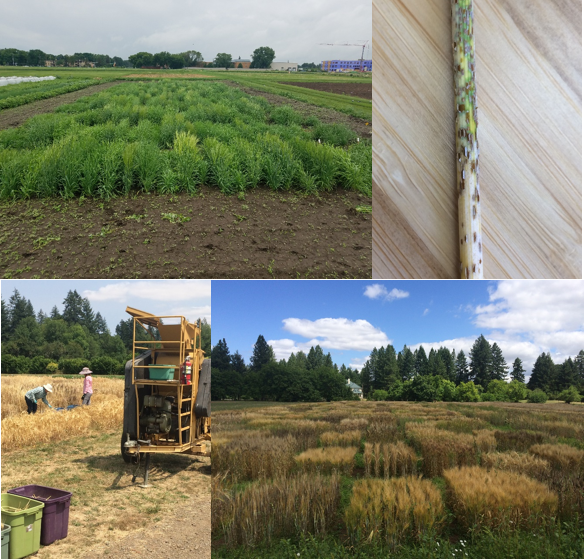
Germplasm:
Regional trials:
- Fall regional trials have been harvested in New York and Corvallis. Starting post-harvest analysis.
- We’re still ~2 weeks from harvesting spring trials in Corvallis. Spring trials have been harvested in New York.
Diversity panel:
- Fall diversity panel harvested at Corvallis. Post-harvest analyses have started
- Spring diversity panel mini-plots of the spring trial are still a few weeks out in Corvallis. We had pretty severe rust pressure this year and got ratings on stripe, leaf, and stem rust.
- Running GWAS using the Corvallis 2018 phenotypic data.
Data management:
- Brigid is working on getting our trials into T3.
Quality testing:
Food testing:
- Jordyn has started testing for food quality on last year’s samples. He has been running beta-glucans, kernel hardness measurements, and RVAs on samples.
Malt testing:
- Please send seed from the FRT and SRT 2019 harvest to the CCRU when seed is clean. If you have smut balls or ergot in your samples, please remove prior to sending to the CCRU!
Feed testing:
- Layer trial is completed and first publication is in preparation. The broiler trial will begin shortly.
Outreach/Upcoming:
- New bulletin on the Buck beers that were served at the Corvallis field day: Read and download the bulletin here.
- Brigid and Lane are headed to Camp Camas in August to speak on a panel about the project.
April 2019
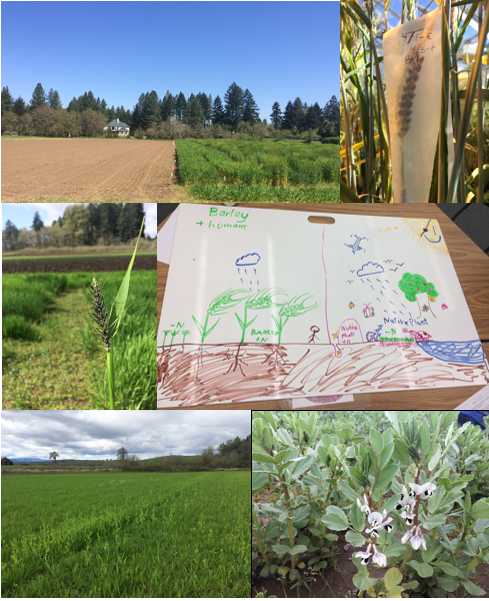
Clockwise from top left: Spring and fall planted trials side-by-side in Corvallis; making crosses to get better malting quality into naked lines; interpretive drawings of our experiment with the 7th graders; fava beans are working really well as a fall cover crop in Corvallis; our 1acre increase block of Buck; smut is a major concern for organic barley- CDC Carter in the spring trial should be resistant to loose and covered smut- please keep an eye out for it this spring!
Regional trials:
We have been doing weed estimates on our fall trial.
We planted our spring trials April 25-26th.
Diversity panel:
We planted mini-plots of the spring trial this year to hopefully get enough seed for everyone to grow full plots next year. Additionally, we planted the winter lines in the spring to see if any are actually facultative. The genotyping has been completed! Still working on cleaning up the 16M data points in order to start the GWAS process.
Increase blocks:
Fall increase blocks were planted in Oregon and Washington.
Food testing:
Food quality testing will be starting soon. We will start with RVAs to measure pre-sprouting. Kevin Murphy will be running additional tests in his lab.
Malt testing:
We have received some CCRU data from the fall trials. Very interesting to see what extremely low proteins will do to a malt analysis! Will soon be starting some trials in our micro-malter to determine best steep/germ protocols.
Feed testing:
Feeding trials for the layers are going well and the eggs are delicious!
Outreach/Education:
School outreach is going well! The OSU group spent a day at Briggs Middle school last week and had a great time discussing agro vs. natural ecosystems with Johannah’s 7th graders. Brigid and Lane spent a day with the new OSU Organic Working group discussing potential collaborations with other folks working on organic systems.
Upcoming:
The 2019 project meeting will be held in Madison, WI in late June
March 2019
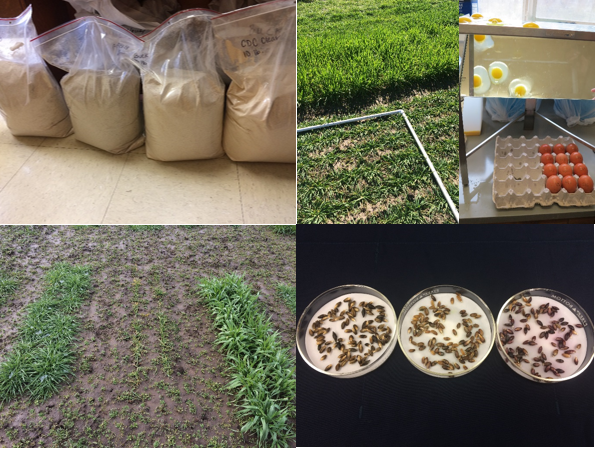
Clockwise from top left: Flours milled for sensory work in Wisconsin; weed estimates in the fall regional trial; egg analysis from the layer feeding trial; germination tests for the colored lines; diversity in the diversity panel!
Regional trials:
- How is winter survival looking in the Midwest and Northeast?
- We started doing weed estimates on our fall trial. If there are any other trials still alive, please start taking weed estimates soon.
- Has anyone had a chance to plant spring trials yet? It’s pretty rainy here, so we’re at least a week out still.
Diversity panel:
- Fall panel survival??
- We’ve been doing early plant height and vigor measurements on the div. panel. If you have survival, please do these as well!
- The genotyping has been completed! Still working on cleaning up the 16M data points in order to start the GWAS process.
Increase blocks:
- Fall increase blocks were planted in Oregon and Washington.
- Seed of MS1054111-01 was shipped from MN for spring increase blocks.
Food testing:
- Food quality testing will be starting very soon. We will start with RVAs to measure pre-sprouting.
- Kevin Murphy will be running additional tests in his lab.
- Julie Dawson held a sensory workshop with barley pita breads made from four varieties.
Malt testing:
- Waiting on CCRU data from last year’s trials.
- Will soon be starting some trials in our micro-malter to determine best steep/germ protocols.
Feed testing:
- Feeding trials for the layers are going well and the eggs are delicious!
Outreach/Education:
- Brian Baker has closed the survey- preliminary results look interesting. We’ll share results once we have a full report.
- School outreach is going well! Thanks to all who are making it happen!
Upcoming:
- The 2019 project meeting will be held in Madison, WI in late June. RSVP emails will be coming soon, so keep an eye out!
February 2019
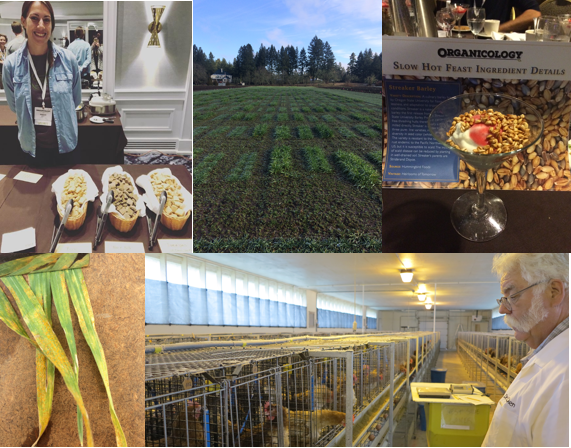
Regional trials:
- How is winter survival looking in the Midwest and Northeast?
- Chris (our PhD student at UW-Madison) is working on the data analyses from the 2017/2018 trials.
- We are nearly done running germ tests and measuring threshability on all entries.
- Seed shipped out for the spring regional trial. Let me know when you get a chance to plant!
Diversity panel:
- Fall panel survival??
- The genotyping has been completed! I am currently cleaning up the 16M data points in order to start the GWAS process.
Increase blocks:
- Fall increase blocks were planted in Oregon and Washington.
- Seed for spring increase blocks is being shipped from MN.
Food testing:
- Food quality testing will be starting very soon.
- Kevin Murphy will be running additional tests in his lab.
- Julie Dawson will be starting sensory work this month.
Malt testing:
- If you haven’t already done so, please send in seed to the CCRU for malt quality analyses from one rep of all entries in both trials.
- We will be malting some (non-organic) Buck to send to OSU Ferm Sci. to test their mash filter so that they’re prepared for the actual trial next fall.
Feed testing:
- Feeding trials for the layers are going well and the eggs are delicious!
Outreach:
- Brian Baker prepared and sent out a survey to organic barley farmers. Follow-up interviews will be conducted when the survey closes.
- Brigid, Scott, and Laura ran a tasting of whole grain, bread, and shortbreads (made by Andrew and Jordyn) at the variety tasting (organized by Lane) at Organicology.
- Brigid gave a presentation on the project at the Organic Ag Research Forum held in conjunction with Organicology.
- Brian also presented a poster about the project at the MOSES Organic Farming Conference.
Upcoming:
- The 2019 project meeting will be held in Madison, WI in late June.
December 2018
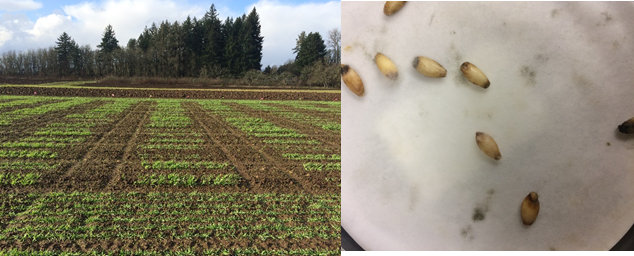
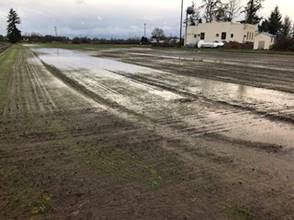
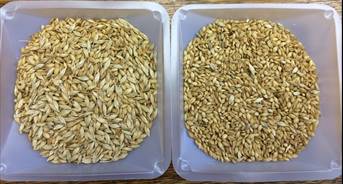
Top left: Diversity panel starting to show differential growth; Top right: Germ testing revealing damaged embryos; Bottom left: Flooded organic cover crops; Bottom right: Best and worst threshing lines in the fall regional trial.
Germplasm:
· Regional trials:
- OSU Fall Regional trial is looking very nice!
- Brigid has now received all regional trial data from MN, WI, and NY. I’ll be standardizing it so we can run stats.
- We have been running germ tests and measuring threshability on all entries.
- We are starting to put together the entry list for the spring regional trial
· Diversity panel:
- Please send Brigid all data from the spring trial once it is compiled!
- Genotyping will begin once the government reopens.
- Send Brigid spring diversity panel needs (any lines with <6g) ASAP!
Increase blocks:
- Fall increase blocks were planted in Oregon and Washington.
- We will be using one of Kevin Smith’s spring lines for our spring increases.
Quality testing:
· Food testing:
- We have a new OSU graduate student, Jordyn Bunting, starting with Andrew Ross to assist with food quality analysis and product testing.
· Malt testing:
- If you haven’t already done so, please send in seed to the CCRU for malt quality analyses from one rep of all entries in both trials.
· Feed testing:
- We have delivered Streaker to Jim Hermes for our poultry feeding study, which is currently ongoing.
Outreach:
· The webinar is now on youtube! If you missed it, check it out and feel free to share with others who might be interested. https://www.youtube.com/user/eOrganic
Upcoming:
- Tastings with Brigid and Lane will be happening in association with the Cascadia Grains Conference and Organicology.
- Brigid and June will be presenting on the project at the Cascadia Grains Conference.
- Brigid will be presenting on the project at the Organic Agriculture Research Forum at Organicology.
- Brigid will be presenting on organic barley production at the Craft Malting Conference.
- The 2019 project meeting will be held in Madison, WI in late June. Stay tuned for more details!
November 2018
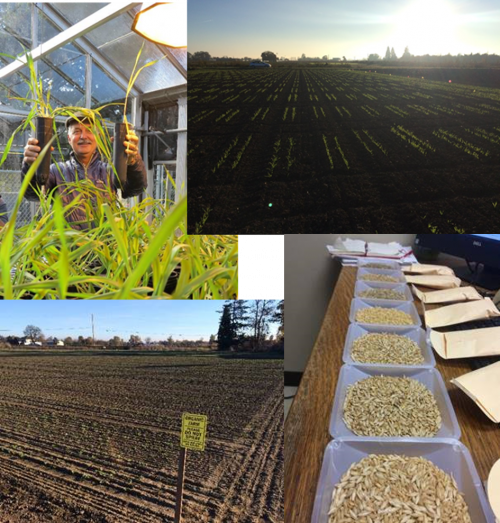
Clockwise from top left: Pat is excited about our greenhouse experiment with the 7th graders!; Fall diversity panel; threshability ratings on the fall regional trial; fava bean cover crop over last year’s barley trials.
Regional trials:
- The OSU regional trial has a few gaps due to a faulty drill, but we were able to get stand counts and vigor ratings done- the plots (mostly) look good!
Diversity panel:
- We are in the process of ordering the Illumina chips for genotyping in Fargo.
· Increase blocks:
- Fall increase blocks were planted in Oregon and Washington.
Food testing:
- We have received samples from Minnesota and samples from New York and Wisconsin are on their way. Thanks to all for getting them to us! We’ll begin conducting food quality tests in the new year.
Feed testing:
- We have delivered Streaker to Jim Hermes for our poultry feeding study, which is occurring this fall/winter.
Upcoming:
- Brigid is presenting the first project-related eOrganic webinar on Dec. 18th at 11am PST. Please register here if you’re interested in attending: https://articles.extension.org/pages/74747/breeding-multi-use-naked-barl...
- Brigid and June will be presenting on the project at the Cascadia Grains Conference.
- Brigid will be presenting on the project at the Organic Agriculture Research Forum at Organicology.
- Brigid will be presenting on organic barley production at the Craft Malting Conference.
- The 2019 project meeting will be held in Madison, WI in late June. Stay tuned for more details!
October 2018


Clockwise from top left: Diversity panel getting prepped for planting; gradations of roasted Streaker; layer birds involved in the barley poultry feeding study; Laura and Brigid are excited about making barley pancakes for middle-schoolers; planting cover crops on our research organic ground.
Germplasm:
• Regional trials:
o Fall regional trials were planted successfully! Stand counts and early vigor ratings should be done soon after emergence.
o Send Brigid all data from the fall and spring trials once post-harvest analysis is complete.
• Diversity panel:
o Please send Brigid all data from the spring trial once it is compiled.
o We are in the process of ordering the Illumina chips for genotyping in Fargo.
o Fall trials were successfully planted, please do early vigor ratings once the barley has emerged.
• Increase blocks:
o Fall increase blocks are being planted in Oregon, Washington, and New York.
Quality testing:
• Food testing:
o We are working on figuring out which phenotypes we will be able to analyze on which trials. Please send in clean seed weights if you haven’t already!
o All collaborators who successfully grew Buck, CDC Clear, or Purple Valley last year should send 10kg of seed to OSU for more extensive baking tests.
• Malt testing:
o If you have not already, please send in seed to the CCRU for malt quality analyses from one rep of all entries in both trials.
o We will be postponing our larger scale brewing tests with OSU fermentation science to next year when we have higher protein bulk seed.
• Feed testing:
o We have delivered Streaker to Jim Hermes for our poultry feeding study, which is occurring this fall/winter.
Education:
• The classes in Oregon is looking at natural vs. agroecosystems this year. We went to their classroom to help plant seeds and eat barley pancakes. The lesson plan and corresponding slides will be distributed soon.
Outreach:
• Pat, Laura, and Brigid spent a morning with Hummingbird Wholesale testing their new roaster in order to work on potentially commercializing roasted Streaker tea with them.
• We will be doing our first webinar with eOrganic in early December (exact date TBA).
September 2018
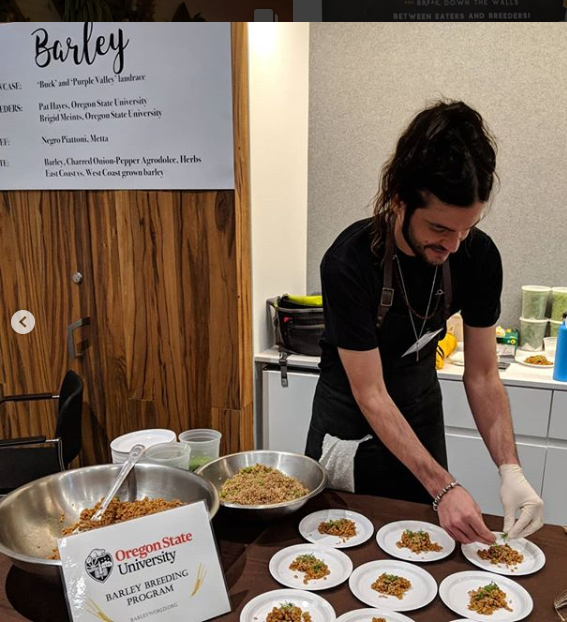
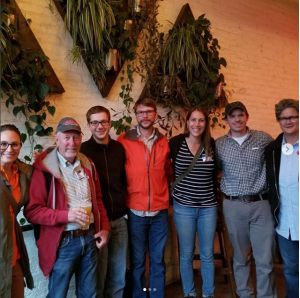
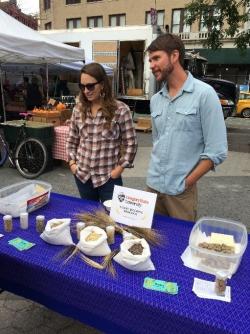
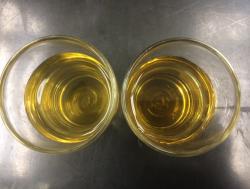
Germplasm:
• Regional trials:
o Everyone is finishing up analysis of the fall and spring regional trials from 2018. I
o The fall regional trial 2018-19 has one new entry. Seed was shipped to all collaborators and trials are starting to get planted.
• Diversity panel:
o The entire panel is now finalized with 384 entries.
o Seed for the fall trial was shipped out to all collaborators.
o Starting the genotyping process this fall.
• Increase blocks:
o Oregon, Washington, and New York should have 1 acre blocks again this fall.
o Stay tuned for a document that will be sent out soon to assess how the increase blocks from last year performed.
o All collaborators who grew Buck, CDC Clear, or Purple Valley last year should send 10kg of seed to OSU for more extensive baking tests.
o Collaborating farmers will receive $500 to cover land use and inputs
Education:
• We’re creating new lesson plans for this school year in Oregon.
Outreach:
• The OSU and Cornell programs had tables at Variety Showcase NYC last week. We worked with a chef who made a braised and sprouted barley dish. Additionally, we had a table outside at the Union Square Greenmarket and handed out barley shortbreads and recipe cards (made by Andrew Ross) to the general public. Great event and lots of barley interest!
• Following the Variety Showcase, June Russell organized a naked barley event. We prepared hot steeps, roasted barley teas, and crackers made from Buck and BB99 for participants to taste. Brigid and Mark Sorrells presented and we got some great feedback from participants.
• Andrew Ross also prepared crackers and wheat/barley rolls for an event. The governor of Oregon is now a fan of barley!
April 2018
Germplasm: Regional trials
- Fall regional trial is part way through flowering in Oregon and looking good. The trial mostly survived the winter in Ithaca, but did not do so well in Madison.
- Spring trials were planted in Oregon and Wisconsin.
- Phenotyping details coming soon!
Diversity panel:
- Spring trials were planted in Oregon and Wisconsin. Updates from the other three states? Winter lines are finishing up in the greenhouse, these lines will be added to the trial for fall 2018.
- Phenotyping details coming soon!
- Lines will be genotyped later this spring.
Education: All states should be working with a lead teacher on spring planting at schools. The middle-schoolers in Oregon will be visiting our field plots later this month; should be a fun visit and we can share our station activities with anyone who would like to host a similar event with their partner school.
For the future: OREI Meeting/Barley Day: May 31/June 1 at Corvallis. We’re very excited to have so many of you joining us! For those not joining, if you have something to report, please let Brigid know and I’ll share with the group. It’s shaping up to be an exciting two days.
Barley Day poster is attached, feel free to distribute to anyone you know in the area who may be interested!
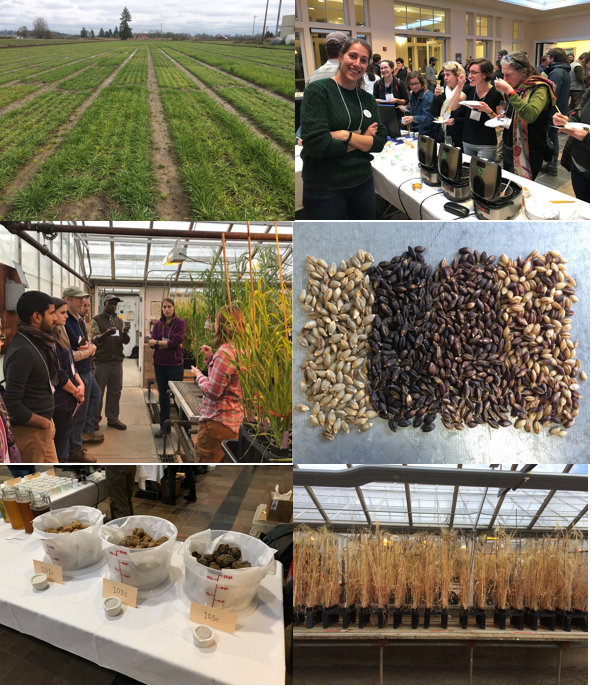 March 2018
March 2018
Germplasm
Regional trials: We met with the OSU extension weed specialist and started weed assessments in the fall trial. We will follow up with breediers about protocol. We need reports on fall winter survival from the colder states. Spring trials were sent out. Too much rain in the PNW to plant yet and it looks awfully snowy in the Midwest.
Diversity panel: A great deal of time went into preparing seed for the diversity panel and we were finally able to send out the spring and facultative entries and designs to all collaborators! Winter lines are finishing up in the greenhouse. These lines will be added to the trial for fall 2018. We will follow up with phenotyping requirements soon. Lines will be genotyped later this spring.
Increase blocks: CDC Clear and Purple Valley seed were shipped to those who requested it.
Education: All states should have a lead teacher and start thinking about spring planting at schools.
Outreach: Brigid Meints spoke on a panel about organic agriculture at the Public Interest Environmental Law Conference at the University of Oregon. Several more naded barley lines are being malted in the CLP at 500g.
Photo: Clockwise from top left: Weed assessments in Corvallis; Kerri at WSU cultivating the fall regional trial at Mount Vernon; Laura tending to winter diversity panel plants in the greenhouse; Stripe rust on the fall regional trial.
January 2018
Germplasm: Regional trials: The fall trial is growing well with minimal weed pressure in Corvallis.We’ll be collecting entries and sending out the spring regional trial in the next few weeks.
Diversity panel: Planning a spring trial of ~260 entries + checks. The earliest entries are beginning to dry down in the greenhouse; the latest entries have not headed.
Increase blocks: Working out details on seed orders. All states should make sure they have a lead teacher identified and start thinking about spring planting at schools. More info in a bulletin from Pat coming soon!
Outreach: Brigid, Pat, Lane, and Andrew presented at the Cascadia Grains Conference along with bakers Dillon Debauche and Mel Darbyshire. We talked about the project and tasted 3 barley breads and 1 wheat bread. The audience greatly preferred the barley breads, although there wasn’t a consensus on favorite variety. Brigid is currently organizing information from the ballots. At OSU we’ve been preparing easy barley recipes (waffles, crepes, crumpets, barley tea) in the lab and taste testing them amongst ourselves and sharing recipes on social media. Additionally, Andrew Ross has been making more complicated breads and biscuits down in his bakery and we’ve also been tasting those. Naked barley is so versatile and delicious! We’ve written another bulletin on beer made with naked malts, look for that one soon.
For the future: · OREI Meeting/Barley Day: May 31/June 1 at Corvallis.
December 2017
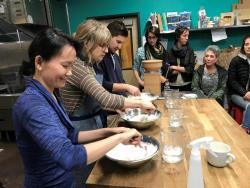
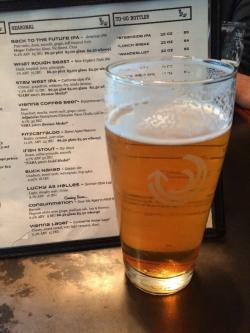
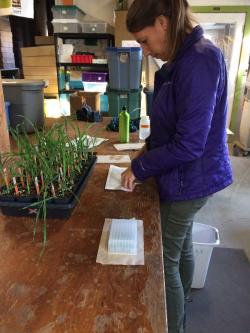
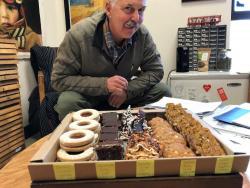
Clockwise from top left: Noodle school with JoMarie Pitino, Buck Naked Beer at Breakside Brewing, Pat enjoying an assortment of barley cookies, Brigid taking tissue from the diversity panel.
Germplasm:
- Fall regional trial: Stand counts taken at most locations. Although it’s a balmy 45° in Corvallis, we should see some winter survival differential at the colder locations (if the trial survives at all). We will be putting together entries for the spring regional trial in the coming month.
- Diversity panel: Tissue was collected from 400 potential entries and sent in for genotyping on the 50K SNP Chip at Fargo, ND. Spring/facultative types will be sent to collaborators as soon as they are harvested for field planting.
Education:
- We are meeting with the lead teacher this week to discuss lesson plans for spring.
- If you have not already identified a lead teacher for your state, please do so in the next month!
Outreach:
- Buck Naked Beer! A Portland brewery made a great beer using Buck as the main malt; we went up and tasted it and discussed challenges/opportunities associated with naked malt. As described by Pat, it tasted like: “Malt-forward butter biscuits with honey.”
- Pat participated in a ‘Noodle School’ event with a local pastamaker, using different barley varieties to make pasta.
- Coming up: Brigid, Pat, Lane, and Andrew will be at the Cascadia Grains Conference talking about and tasting naked barley products with local bakers.
For the future:
- OREI Meeting/Barley Day: May 31/June 1 at Corvallis. We’ll get a rough timeline together soon.
- Pictures! We need pictures from sites other than Corvallis! Please email/dropbox/text your pictures to Brigid so we can post them to social media/websites.
- Spring planting: regional trial, diversity panel, increase blocks. Start thinking about seed needs/land needs soon!
October 2017
Germplasm: · Fall regional trial planted all locations. Fall increase blocks planted at Corvallis (Buck), Mount Vernon (Buck), and Ithaca (Buck and #STRKR).
Diversity panel: Entries planted in greenhouse for seed increase and genotyping – we were cruelly assaulted by rodents. We have re-planted.
Education: · A day of outreach on the selection unit with Briggs Middle School (Springfield, Oregon). The kids loved it! Partnering teachers are working on a formal lesson plan
Outreach: The Plant Variety Showcase was a dream! Lane Selman’s energy condensed into a single evening… We had 5 delicious barley dishes prepared by some incredible chefs and bakers. Pictures at https://shawnlinehan.photoshelter.com/gallery/2017-CBN-Variety-Showcase/...
To think about: Variety (varieties) for the spring increase blocks: CDC Clear, Meg’s Song, Havener, Julie, Transit, or Goldenheart. CDC Clear is the only modest beta glucan type. Full data coming on these choices – if you have experience with any or all of these, please share with Brigid Meints!
Social Media: If you haven’t checked out our Instagram and Facebook pages and encourage others to follow.
Funding

This project was funded in 2017 by the NIFA Organic Research and Extension Initiative grant, part of the USDA National Institute of Food and Agriculture: Grant number 2017-51300-26809. In 2020, a second grant, Developing Multi-Use Naked Barley for Organic Systems II was awarded funding: Grant number 2020-51300-32179. In 2023, a third grant was awarded funding: Grant number 2023-51300-40964.


